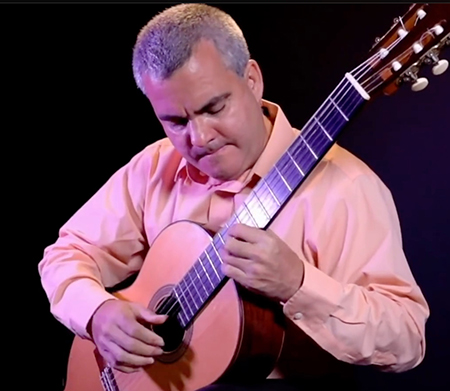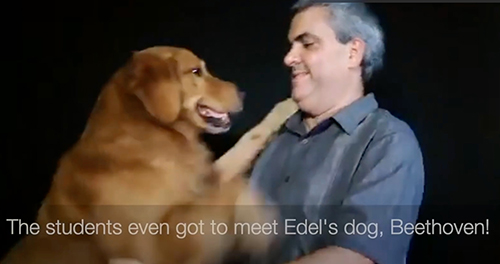by Daniel Hathaway

As Muñoz told the students in a Q&A, he began playing popular guitar in Cuba at the age of 7, then moved on to classical when he turned 9. Early on, he impressed the likes of Leo Brouwer, who described the 13-year-old guitarist as “perfect” and “professional,” qualities that came through clearly in his recent performance. (The recording remains available on-demand here.)
Announcing his selections both in English and Spanish, Muñoz began his brief but varied program with Frank A. Wallace’s Black Falcon, which was written for him in 2013. In turn, his performance was dedicated to the memory of the composer, a prolific and much-loved figure who taught guitar at the New England Conservatory, played in the ensembles Quadrivium and Live Oak, and died in New Hampshire in June of 2020. (Read his obituary here.)
The piece is moody, restless, and ruminative. After an atmospheric beginning, accented chords with recitative-like elements in between usher in a rhythmic section that deconstructs into melodic fragments. The piece ends with increasingly dissonant chords.
For a complete contrast, Muñoz moved on to an expressive performance of Julio César Oliva’s Vengo a decirte que te quiero (“I come to tell you that I love you”), playing with much rubato and emotion.
Antonio Lauro’s Variaciones sobre una canción infantil offered the composer’s four impressions of a children’s song, each in A-B-A form and set in various textures: the melody over an alberti bass, sprightly and chordal, minor and serious (but turning into the major with an injection of sentimentality), and scherzo-like with bouncy, upward gestures.
Two smaller works, Eduardo Martin’s Mirándote and Sindo Garay’s Perla Marina (arranged by Rey Guerra), brought blue notes and a more populist brand of expressiveness into the mix.
Muñoz ended with a well-known, expansive work: Manuel Maria Ponce’s Sonatina meridional, requested by Andrés Segovia and invoking sunny scenes from the South in its three movements, Campo, Copla, and Fiesta. Here, as throughout his program, Muñoz played efficiently, concentrating his energy in his fingerwork and only betraying the complexity of the music through subtle facial expressions. He made his job look effortless.

Published on ClevelandClassical.com April 21, 2021.
Click here for a printable copy of this article



